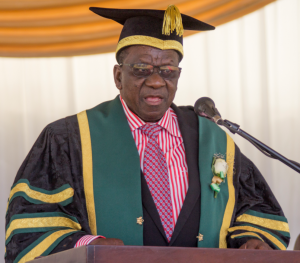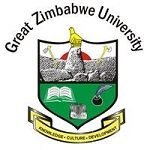Construction of GZU School of Medicine to massively transform healthcare system
Great Zimbabwe University’s Medical School, which is under construction at the University’s campus in the Clovelly area of Masvingo, is set to massively transform the healthcare system in Masvingo province and the region, Vice Chancellor Professor Rungano Zvobgo has said.

Vice Chancellor Professor Rungano Zvobgo
Speaking at Great Zimbabwe University’s 13th Graduation Ceremony held on Saturday, 2 November 2019 at the Main Campus, Professor Zvobgo said that once completed, the Medical School will bring state-of-the-art facilities to meet the community and the nation’s current and future health needs. He said that the school is expected to attract the much need specialists to come and set up practice in Masvingo thus eliminating the high costs of travelling for specialist care in faraway places.
“It is heart-rending Your Excellency, to note the precious lives that have been lost in transit to Harare and other places in search of specialist treatment, often at restrictive costs, said the Vice Chancellor.
Professor Zvobgo said that the GZU Medical School will train a different kind of a medical doctor.
He said, “We aim to train doctors to serve and to know that no matter how hard things may become they should never abandon patients. This is the spirit that must permeate every aspect of our medical training. If we fail to inculcate in our medical graduates, these ethos, this whole project will have been a complete failure”.
Calling on the Government to upgrade Masvingo Provincial Hospital in readiness to partner the GZU medical school for teaching and learning purposes, Professor Zvobgo said that the school will be established in response to the critical skills gap in the medical sciences. The establishment of the School of Medicine at Great Zimbabwe University is important in order to address the critical shortage of medical specialists in the country, said the Vice Chancellor. Professor Zvobgo said that another strategic operation of the medical school would be to create synergies and interactions between hospital trained midwives and community midwives.
“We know they exist in various traditional, cultural and religious setups, hence the need to capacitate them and ensure zero infant and maternal mortalities in our community. In the same breadth, we will set up within the same school, a centre for the study of Traditional medicines and indigenous knowledge systems, research around which is already taking place. So many of our traditions as Africans are being studied and patented elsewhere, hence the need to tell our own stories and document our own traditions,” he said.
Professor Zvobgo said that the medical school will be backed by a strong department of pharmaceutical studies that will enable students to manufacture medicines that work for the people.
The Vice Chancellor announced assistance that the University received from Medishare and the outgoing African Union Ambassador to the United Nations, Dr. Arikana Chihombori- Quao, in sourcing equipment for the Medical School worth US$250 000.
Professor Zvobgo said that the construction work at the School of Medicine which is being led by the University’s Department of Works and Estates is progressing well.

